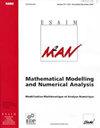Convergence analysis of a fully discrete finite element method for thermally coupled incompressible MHD problems with temperature-dependent coefficients
IF 1.9
3区 数学
Q2 Mathematics
Esaim-Mathematical Modelling and Numerical Analysis-Modelisation Mathematique et Analyse Numerique
Pub Date : 2022-03-15
DOI:10.1051/m2an/2022028
引用次数: 4
Abstract
In this paper, we study a fully discrete finite element scheme of thermally coupled incompressible magnetohydrodynamic with temperature-dependent coefficients in Lipschitz domain. The variable coefficients in the MHD system and possible nonconvex domain may cause nonsmooth solutions. We propose a fully discrete Euler semi-implicit scheme with the magnetic equation approximated by Ne´de´lec edge elements to capture the physical solutions. The fully discrete scheme only needs to solve one linear system at each time step and is unconditionally stable. Utilizing the stability of the numerical scheme and the compactness method, the existence of weak solution to the thermally coupled MHD model in three dimensions is established. Furthermore, the uniqueness of weak solution and the convergence of the proposed numerical method are also rigorously derived. Under the hypothesis of a low regularity for the exact solution, we rigorously establish the error estimates for the velocity, temperature and magnetic induction unconditionally in the sense that the time step is independent of the spacial mesh size.具有温度相关系数的热耦合不可压缩MHD问题的全离散有限元收敛分析
本文研究了在Lipschitz域中具有温度相关系数的热耦合不可压缩磁流体力学的完全离散有限元格式。MHD系统的变系数和可能的非凸域会导致非光滑解。我们提出了一个完全离散的欧拉半隐式格式,用Ne ' de ' lec边缘元近似的磁方程来捕获物理解。完全离散格式在每个时间步只需要求解一个线性系统,并且是无条件稳定的。利用数值格式的稳定性和紧致性方法,建立了三维热耦合MHD模型弱解的存在性。此外,还严格推导了该数值方法弱解的唯一性和收敛性。在精确解的低正则性假设下,严格地无条件地建立了速度、温度和磁感应的误差估计,即时间步长与空间网格尺寸无关。
本文章由计算机程序翻译,如有差异,请以英文原文为准。
求助全文
约1分钟内获得全文
求助全文
来源期刊

CiteScore
2.70
自引率
5.30%
发文量
27
审稿时长
6-12 weeks
期刊介绍:
M2AN publishes original research papers of high scientific quality in two areas: Mathematical Modelling, and Numerical Analysis. Mathematical Modelling comprises the development and study of a mathematical formulation of a problem. Numerical Analysis comprises the formulation and study of a numerical approximation or solution approach to a mathematically formulated problem.
Papers should be of interest to researchers and practitioners that value both rigorous theoretical analysis and solid evidence of computational relevance.
 求助内容:
求助内容: 应助结果提醒方式:
应助结果提醒方式:


